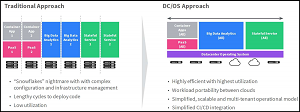News
Mesosphere Open Sources Software for Containers and Stateful Services
- By David Ramel
- April 19, 2016
Mesosphere Inc. today unveiled the beta release of its newly open sourced DC/OS software, which helps organizations build and manage modern distributed applications in container-based datacenters.
The software is based on the open source Apache Mesos project. That project's Web site says it "abstracts CPU, memory, storage and other compute resources away from machines (physical or virtual), enabling fault-tolerant and elastic distributed systems to easily be built and run effectively."
Through that abstraction, the new software can make an enterprise datacenter appear as a single computer, able to leverage pooled resources and manage microservices, containers (such as Docker), Big Data analytics and other workloads.
Mesosphere, which developed a commercial enterprise product based on Mesos, is guiding the new open source DC/OS offering, which still leverages the open source Mesos code while adding open sourced software that was formerly proprietary, such as the company's GUI and Minuteman load balancers.
For modern app development, Mesosphere said the software helps developers build several different types of projects. Those include: microservices applications using the Docker container offering and Marathon, its container orchestrator; Big Data analytics and machine learning applications, which can integrate with Spark, Kafka and Cassandra; and infrastructure-agonostic applications that run on any bare-metal implementation, or in private or public clouds.
 [Click on image for larger view.]
Contrasting Approaches (source: Mesosphere)
[Click on image for larger view.]
Contrasting Approaches (source: Mesosphere)
DC/OS contains more than 30 component technologies, developed with the help of more than 60 partners, including Accenture, Cisco, Hewlett-Packard Enterprise and Microsoft.
The company gave a special thanks to Microsoft, which worked closely with Mesosphere and applied its efforts to its own new Azure Container Service.
"Announcing general availability today, the Azure Container Service uses DC/OS to provide an easy-to-use, but powerful and reliable way to orchestrate containers at scale," Microsoft said in a statement today. "With Azure Container Service, users get a reference implementation of DC/OS that can be deployed at scale in a matter of minutes by providing a very small set of parameters such as the size and location of the cluster. We believe Azure Container Service is the easiest way to get started with DC/OS for learning and experimentation or for production workloads."
Mesosphere is currently organizing the DC/OS project as it gains contributions and roadmaps from the open source community. Likening the effort to the early stages of Linux, the company said this policy is a proven path to success in this stage of the project.
"Derived from Mesosphere's revolutionary Datacenter Operating System, the 100 percent open source DC/OS offers powerful capabilities for container operations at scale and single-click, app-store-like installation of 20+ complex distributed systems (called DC/OS 'services'), including HDFS, Apache Spark, Apache Kafka, Apache Cassandra and more," the company said in a statement today. "DC/OS lets every company deploy the automated infrastructure powering applications at some of the world's largest technology companies."
A Mesosphere blog post expounded on that theme. "DC/OS helps companies adopt the advanced operational and architectural practices of organizations such as Apple, Yelp, Netflix and Twitter (and, at a broader level, Facebook and Google) without having to reinvent the wheel or hire scores of distributed systems engineers," the post said. "DC/OS brings this type of advanced datacenter environment and application platform to anyone, anywhere they wish to run it."
Mesosphere said it would continue to sell its related enterprise offering, Mesosphere Enterprise DC/OS, formerly called DCOS Enterprise Edition, which incorporates enterprise features such as improved security, performance, networking, compliance, monitoring and multi-team support that are missing in the pure open source project.
About the Author
David Ramel is an editor and writer for Converge360.